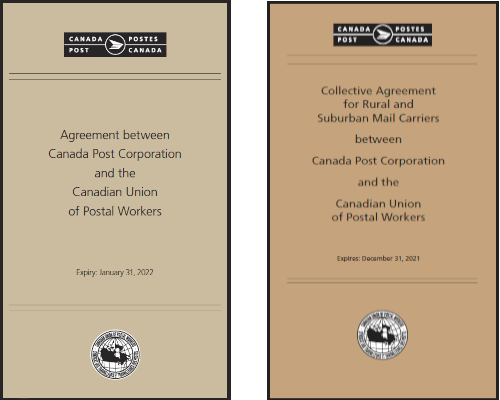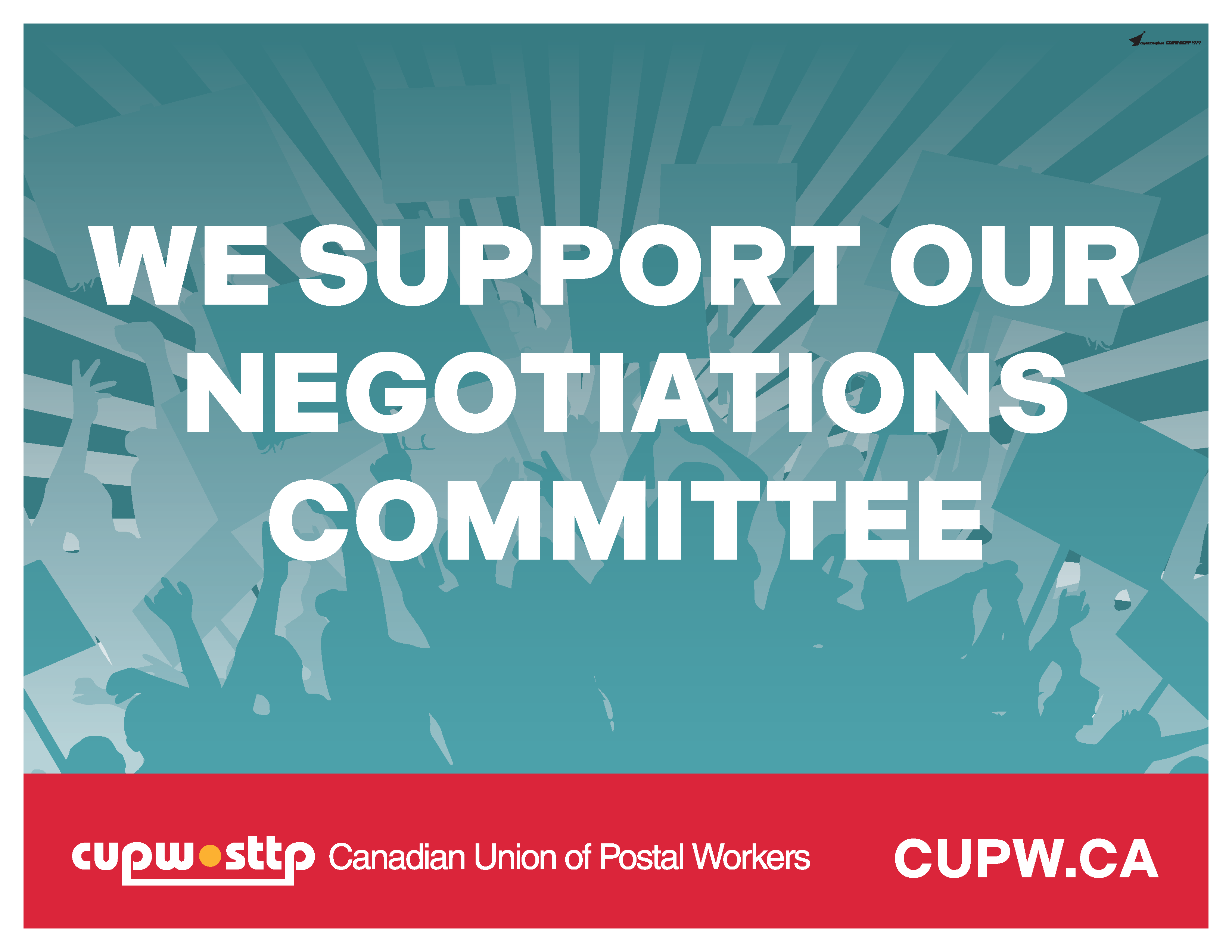**Ratification Voting begins Tuesday August 3rd, 2021 to Friday September 3, 2021**
Before You Make Your Decision
Frequently Asked Questions and Answers: Information Fact Sheet #1
Updated as of Sunday August 1, 2021
In recent weeks, several questions have been asked about the process that led to the renewal of agreements and the tentative MOAs between CUPW and CPC for the Urban and RSMC units.
Q) Why are we having this referendum vote on a two-year renewal when we have been preparing for full-scale bargaining to begin in the autumn?
A) Canada Post came to us with the original proposal to renew the Collective Agreements for a period of two years. The NEB knew the members should decide. The two-year renewal increases our wages, improves our security, and makes some improvements. It also provides an opportunity for CPC to expand into new services that will create new revenue streams and help improve CPC’s financial situation. This will allow CUPW to address outstanding issues and negotiate improvements to our working conditions in the future. Also, no one knows what the post-pandemic economic and political climate will look like. Inflation and a potential change in Government would have a real effect on negotiations.
The NEB believed it was proper and necessary to let the membership decide. However, the original bargaining process continues. The NEB will meet in September to review all of the proposed demands that were submitted from the regional conferences. If the ratification vote is rejected we will continue with the traditional process. If the ratification vote passes, we will still raise these priority issues with CPC.
Q) How did the NEB determine what issues to raise with CPC?
A) We considered the priorities and issues that were raised in the recent regional conferences as well as the Union’s demands in previous rounds of bargaining. Increased wages, the double bundle, an hourly rate and pay for all hours worked by RSMCs, training for Group 3 and 4 for the maintenance and repair of the future fleet of electric vehicles, access to information for Group One staffing – all of these issues were included in previous Programs of Demands that had been ratified by the membership.
Q) Doesn’t the CUPW Constitution require the Negotiating Committee to make the decisions on negotiations?
A) No. The Constitution is clear that the major decisions, such as referring a tentative agreement to the membership for ratification, is made by the NEB. The negotiating committee makes a recommendation to the NEB, but the NEB makes the decisions. In practice, the NEB plays a major role and makes the major decisions in all of our negotiations. The negotiating committee has been selected, but has not begun to function and the National Programs of demand have not yet been ratified by the membership.
Q) What makes the NEB think this agreement is good enough?
A) There are many improvements that have been described in other bulletins. Whenever we negotiate a collective agreement, there are a number of considerations and questions. Could we do better by striking or other job action given the existing political and economic situation? Are there rollbacks? Does the agreement provide better job security, better benefits, and good wages? Does it promote greater equality and safeguard health and safety?
Everyone knows we cannot achieve all of our demands in one round of bargaining. But the most interesting thing is that it is the first time since 1995 that all of the members of the NEB think this agreement is good enough to recommend it to the membership.
Q) Have we ever extended collective agreements before?
A) Yes. Prior to 2018, the past three times we were legislated back to work – 1991, 1997, and 2011 – the NEB signed agreements with Canada Post extending the agreement beyond the term that was provided for in the legislation. In each case the changes were put to a ratification vote. The difference this time is that we were approached by CPC with an offer at the same time as we were preparing for future negotiations. The NEB replied with proposals that reflected the priorities and issues that were raised in the recent regional conferences as well as the Union’s demands in previous rounds of bargaining. CPC came back with an offer that addressed several of the union’s priority issues and contained important improvements. The NEB discussed the offer and reached unanimous agreement that it should be put to the membership to make the final decision.
Q) Is this process Constitutional and democratic?
A) Yes. The Constitution is clear; Article 2.02 reads as follows: “The highest authority resides and comes from the membership.” There is nothing more Constitutional and more democratic than holding a national referendum to permit the membership to decide on their wages and working conditions.
Q) What happens if the membership rejects the tentative agreements?
A) We continue with the traditional process we had already started. The NEB ensured that the process of gathering demands through regional conferences for both Units was unhindered. The NEB will formulate a National Program of Demands for both the Urban and RSMC units and we will proceed to a membership referendum on the Program of Demands for both units. If accepted, bargaining will begin in the fall. If the tentative agreements are rejected, CUPW and CPC have reserved the right to present different and more numerous demands than those addressed in the tentative agreements and nothing discussed, presented or agreed to in principle during the discussions shall be relied upon or considered conceded if traditional negotiations occur.
Frequently Asked Questions and Answers: Information Fact Sheet #2
Question: Where can I find the actual terms of the tentative agreements?
Answer: The complete tentative agreements are posted on the CUPW website. Go to WWW.CUPW.CA.
Question: The urban tentative agreement refers to the Memorandum of Agreements (MOAs) reached at the Deerfoot facility as possible alternatives to Separate Sort and Delivery (SSD). What are these MOAs?
Answer: CPC is introducing Separate Sort and Delivery in facilities to address the problems of lack of space due to increased parcels. Instead of introducing SSD, the urban Deerfoot MOA provides for four letter carriers assigned to one case with two carriers on each wave. On both waves one letter carrier sorts the mail, ties out, takes sequenced mail and prepares packets and loads. Upon their return to the facility, that letter carrier will unload and prepare neighborhood mail. The second letter carrier prepares packets, sequences mail and loads. Upon their return to the facility that employee will sort manual mail to be delivered on the next delivery day and sort neighborhood mail.
Question: Is there also a Deerfoot MOA for RSMCs?
Answer: Yes. The RSMC MOA provides for RSMCs to have two waves with two RSMCs sharing an A-62 case. RSMCs are also paid for all hours worked and overtime paid for all time after 8 hours per day.
Question: What dates are updated and why is that necessary?
Answer: Some dates, like the date in Article 53 of the urban agreement, determine the type of job security provisions to which an employee is entitled. Others, such as the dates in Appendix I, determine when we are protected from contracting out. In previous rounds of bargaining the Employer has tried to change and even eliminate these provisions.
Question: When does my local vote?
Answer: The schedule for all locals is on the union website. Go to WWW.CUPW.CA
Question: Will an hourly rate impact on drive time or vehicle expense?
Answer: CUPW wants RSMCs to be paid on the basis of an hourly rate to ensure that RSMCs are paid for all hours worked and receive overtime in the same manner as letter carriers. Being paid on the basis of an hourly rate will not change the formula to determine the amount of drive time attributed to a route or the amount of the vehicle expense kilometre reimbursement rate which is equal to the Canada Revenue Agency’s automobile allowance rate for the year.
Should you have any questions, you can email president@royalcity.ca and the Local will get back to you as soon as possible.
In solidarity,
CUPW Royal City Local


